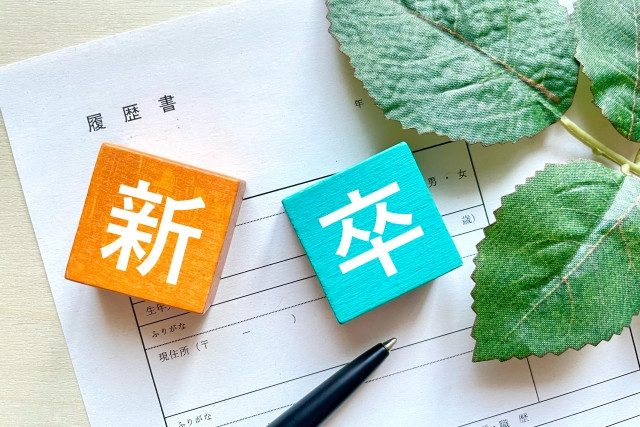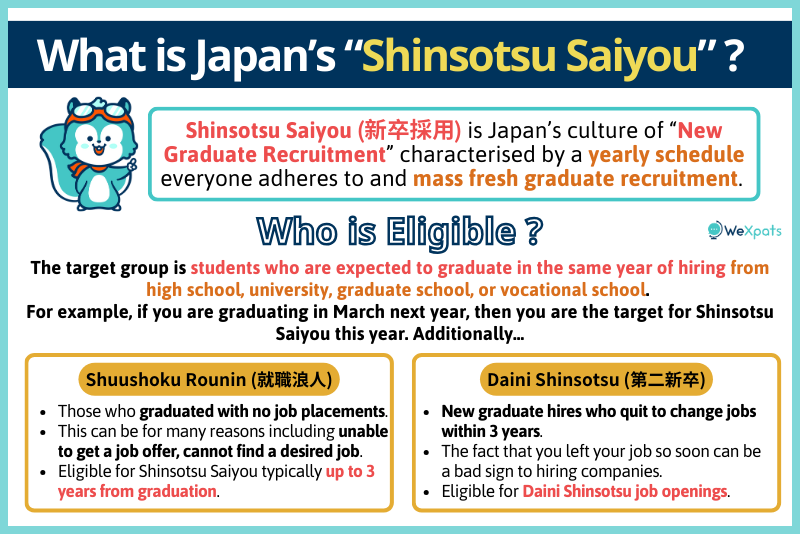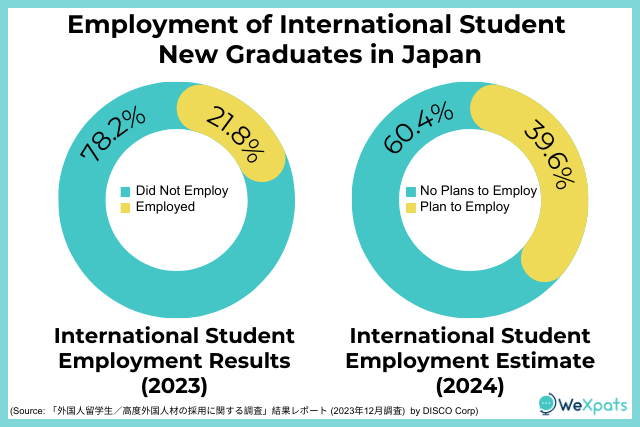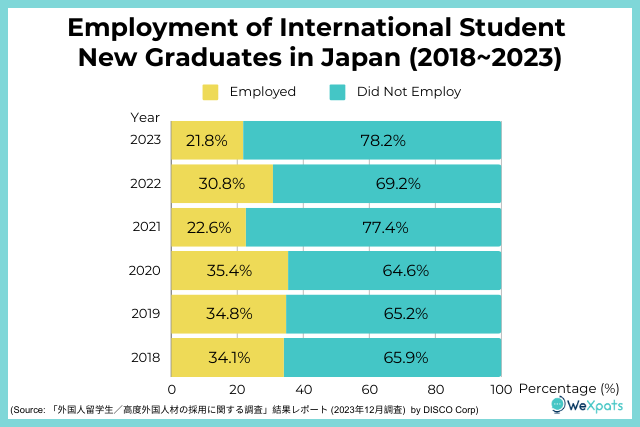新卒採用 (Shinsotsu Saiyou), aka “New Graduate Recruitment”, is Japan’s traditional recruitment system of recruiting new graduates from high school, university, vocational school by Japanese companies. Learn all about it in this article.
First Published: 2021-03-12
Updated: 2024-05-28
Table of Contents
- A Look at New Graduate Recruitment in Japan
- Is New Graduate Recruitment in Japan Different for International Students?
- Employment Rate for International Student New Graduates in Japan
- Average Fresh Graduate Salary in Japan
- Looking for a Full Time Position? Leave it to WeXpats Agent!
There are 4 important Japanese terms to know when it comes to job hunting in Japan; 就活 (Shuukatsu), 転職 (Tenshoku), 新卒採用 (Shinsotsu Saiyou), and 中途採用 (Chuutou Saiyou).
就活 (Shuukatsu) and 転職 (Tenshoku) are terms typically used by jobseekers:
-
就活 (Shuukatsu) means “Job Hunting”, derived from 就活活動 (Shuukatsu Katsudou) meaning “Job Hunting Activity”. Shuukatsu refers specifically to job hunting for fresh graduates.
-
転職 (Tenshoku) meaning “Job Change” and 転職活動 (Tenshoku Katsudou) meaning “Job Change Activity” refers to mid-career job change or mid-career job hunting.
新卒採用 (Shinsotsu Saiyou) and 中途採用 (Chuutou Saiyou) are terms typically used by hiring companies:
-
新卒採用 (Shinsotsu Saiyou) meaning “New Graduate Employment / Recruitment”, refers to the practice of recruiting new graduates by Japanese companies.
-
中途採用 (Chuutou Saiyou) meaning “Mid-Career Recruitment / Employment”, refers to the hiring of mid-career people by Japanese companies.
In this article, we will focus on learning all about 新卒採用 (Shinsotsu Saiyou).
 Are you having any issues with job-hunting in Japan?
Are you having any issues with job-hunting in Japan?
A Look at New Graduate Recruitment in Japan

新卒採用 (Shinsotsu Saiyou) means “New Graduate Employment” or “New Graduate Recruitment”. When looking for jobs as a new graduate, this is the keyword to look out for on job openings. When “Shuukatsu Season” approaches and final year students start job hunting, you can see this keyword used often on company hiring posters and recruitment websites.

Characteristics of New Graduate Recruitment in Japan
Japan’s new graduate recruitment system is characterised by mass hiring of fresh graduates and a strict annual job hunting schedule.
- Japanese school years start in April and end in March, with students graduating from school in March.
- Most Japanese companies follow a fiscal year that begins on April 1st.
Therefore, new graduates that graduate in March will start work the following month in April. With such a short time gap, when does job hunting begin? In the final year of school.
The “Shuukatsu Season” or “Job Hunting Season” generally begins in a student’s final year, typically from March the year before graduation, students will start job hunting in earnest including attending job fairs and company information sessions, submitting entry sheets and resume, completing aptitude tests and written examinations, and attending job interviews.
If all goes well, students will receive a preliminary job offer around July ~ September, join an orientation for prospective employees and receive an official job offer in October ~ November, and join the company in April the next year after graduating in March.
Read our step-by-step guide about Job Hunting in Japan for International Students here.
Who are eligible for “New Graduate Recruitment (新卒採用, Shinsotsu Saiyou)”?

The target group for Shinsotsu Saiyou are students who are expected to graduate in the same year of hiring, e.g. students that will be graduating in March next year are the targets for Shinsotsu Saiyou this year. New graduates from high school, university, vocational school, graduate school in the same year of hiring are also eligible for job openings for new graduates.
What is Shuushoku Rounin (就職浪人) ?
The strict schedule of Japanese recruitment culture makes it so that most people would have received a job offer and placement waiting for them after graduation, so a seamless transition of graduating in March and starting work in April.
As such, there is a term called 就職浪人 (Shuushoku Rounin) meaning “Jobless University Graduate” for new graduates with no jobs. This can be for many reasons including unable to get a job offer, or wanting to work a job with desired conditions. Shuushoku Rounin are eligible for Shinsotsu Saiyou job openings, though typically only up to 3 years from graduation. Finding a job may be more difficult for Shuushoku Rounin.
Is there an age limit for “New Graduates””?
There is no age limit for “New Graduates”. Most new graduates are 18 years old for high school graduates, early 20s for university and vocational school graduates, and mid 20s for graduate school graduates. Keep in mind that those who leave work to continue studies in graduate school are not considered as new graduates, but as mid-career.
Even though there is technically no age limit for new graduates, those over 30 years old tend to be considered as mid-career.
What is Daini Shinsotsu (第二新卒)?
第二新卒 (Daini Shinsotsu) refers to “recent graduates looking to change jobs”. New graduate hires who quit the company to change jobs within 3 years are considered as Daini Shinsotsu. Though having work experience can be an advantage during hiring evaluations, the fact that you left your job within a short period can be a bad sign to the hiring company.
The interview stage is crucial for Daini Shinsotsu jobseekers. Provide a good reason for leaving your previous place of employment so soon after employment, and avoid criticising your previous workplace too much.
Writer's Pick
Is New Graduate Recruitment in Japan Different for International Students?

No, international students graduating from Japanese universities and vocational schools will need to go through the same process as Japanese students for new graduate recruitment. Though the recruitment process is the same, Japanese companies will also be looking at international students’ Japanese language proficiency and ability to communicate in Japanese.
According to the “Survey on Career and Retention for International Students 2015” available in JASSO’s Job Hunting Guide for International Students 2025, 90% of Japanese companies expect JLPT N1 level from international students without English skills, while some companies accept JLPT N2 from international students with English skills.
※ JASSO, “JASSO’s Job Hunting Guide for International Students 2025” Page 9
The importance of Japanese language skills for international student recruitment was reiterated in a recently conducted “Survey on Recruitment of International Students and Highly-Skilled Foreign Human Resources” by DISCO. The survey revealed that 45% of liberal arts companies and 45.5% of science companies sought international students with advanced business to native level Japanese language skills during the hiring process, among which 12.5% of liberal arts companies and 13..8% science companies preferred native level Japanese in candidates.
Furthermore, the survey also revealed that after joining a company, it becomes apparent that a higher level of Japanese language ability (compared to the hiring process) is required for work. 72.3% of liberal arts companies and 69.7% of science companies required advanced business to native level Japanese language skills for work, among which 33.9% of liberal arts companies and 28.4% of science companies required native level Japanese.
※ The survey does not use JLPT levels as a benchmark, but advanced business level would be JLPT N2~N1 level, and native level would be JLPT N1 and above level.
※ DISCO, “「外国人留学生/高度外国人材の採用に関する調査」結果レポート (2023年12月調査)” Page 5
Employment Rate for International Student New Graduates in Japan

The employment rate for international student new graduates in Japan has been steadily increasing over the years. According to DISCO’s “Survey on Recruitment of International Students and Highly-Skilled Foreign Human Resources”, the biggest reason Japanese companies are keen to hire international students is to secure excellent human resources, as chosen by 64.0% of liberal arts companies and 73.8% science companies. Other reasons include…
- Foreign nationals’ strengths like international awareness and sensitivity
- To carry out works that require foreign language proficiency
- To revitalise the company, including impact on Japanese workers
- To handle tasks and dealings with overseas clients
- To strengthen diversity
and more.
※ DISCO, “「外国人留学生/高度外国人材の採用に関する調査」結果レポート (2023年12月調査)” Page 4


From 2018 to 2020, over 30% of Japanese companies hired international students. In 2021, the percentile dropped to 22.6% due to the coronavirus pandemic but recovered to 30.8% in 2022. The numbers however dropped again to 21.8% in 2023, perhaps as the number of international students in Japan had not recovered. In 2024, near 40% of Japanese companies are expected to hire international students, among which 46.3% belong to non-manufacturing sectors.
※ DISCO, “「外国人留学生/高度外国人材の採用に関する調査」結果レポート (2023年12月調査)” Page 2
And, in recent news, the Japanese Immigration Services Agency has announced that conditions for granting status of resident to international students graduating from Japanese vocational schools will be relaxed in order to retain talented foreigners in the country which is suffering from severe labour shortages.
Until now, international students from Japanese vocational schools are required to find jobs that are relevant to a certain extent to the course studied to qualify for a status of residence. This has made it difficult for many graduates to continue staying and working in Japan.
Following this change, the status of residence type “Engineering / Specialist in Humanities / International Services” will become available to Japanese vocational school international student graduates. The immigration agency will evaluate applications with more flexibility, and vocational school graduates will be treated similarly to Japanese university or graduate school graduates.
It is expected that this change will increase the hiring number of new graduate international students from Japanese vocational schools by around 3000.
※ The Japan News, “Japan to Give More Job Opportunities for Foreign Students” [2024.02.29]
Average Fresh Graduate Salary in Japan

Fresh graduate salaries in Japan can vary widely depending on factors such as industry, company size, location, educational background, and individual qualifications. On average, fresh graduates in Japan can expect a starting salary ranging from 200,000 to 300,000 Yen a month, or 2.4 to 3.6 million Yen a year. This range can also vary based on the factors mentioned previously, with some fresh graduates earning higher or lower salaries in certain industries or companies.
Industry
Fresh graduates entering fields such as finance, engineering, and IT may receive higher starting salaries compared to other industries. Additionally, fresh graduates in sales, marketing and real estate fields may receive higher salaries due to commission-based payments, where your performance is rewarded.
Location
One of the biggest factors that affect salary range is location. Different regions and cities in Japan have different minimum wage, cost of living, rental prices, etc. factors that determine the average salary of the area. Major urban areas like Tokyo, Yokohama, and Osaka tend to pay higher salaries to match the higher cost of living in the areas.
Company Size and Reputation
Larger and more established companies typically offer higher starting salaries compared to small or medium-sized enterprises. Multinational corporations also often provide competitive salaries and benefits to attract top talents in the country.
Educational Background and Qualifications
Graduates from higher levels of education, from prestigious universities, or holding specialised qualifications required for the position may command higher starting salaries. This ties into how much potential the company thinks you carry.
One thing to keep in mind is that most companies do not offer bonuses to employees in their first years, and this applies to new graduate hires as well. There are companies who do offer bonuses even to new graduates in their first year of employment, so check the job details before applying. You may want to weigh how important a bonus is in the first year with career progression and subsequent salary raises in the later years of your career in the company, and whether that first year bonus is worth joining or not joining a company.
Looking for a Full Time Position? Leave it to WeXpats Agent!

WeXpats Agent is a career support service that specialises in employment for foreign nationals living in Japan.
Recruitment agencies in Japan are a service where dedicated career advisors will assist you with your job hunt for free. In addition to introducing open positions, we also provide support to help you create your Japanese resume and practice for interviews. Worried about job hunting in Japanese? We are here for you.
Features of WeXpats Agent
-
We have many job openings that are a good fit for foreign nationals to work in, such as translation, interpretation, inbound, etc. jobs that make use of your language skills, as well as engineering etc. jobs that do not require Japanese skills.
-
Our career advisors support and help you prepare your resume and practice job interviews with you. Clearly communicate your strengths to the hiring company.
-
We will handle communication with companies on your behalf, such as arranging interview dates and negotiating conditions. And thereby reducing your stress and time spent.



































